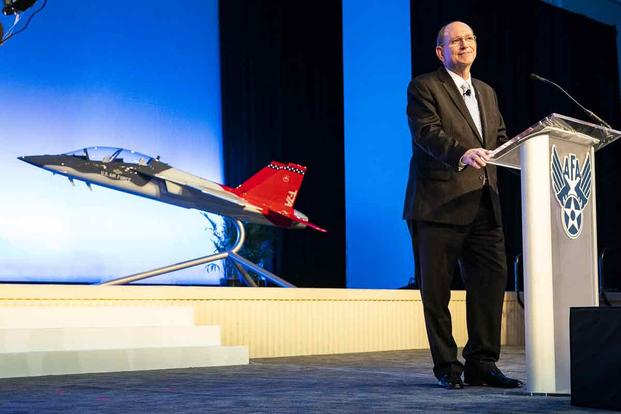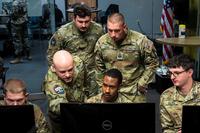The Air Force's new T-7A Red Hawk training jet was expected to be delivered to the service in 2023, but software issues and ejection seat concerns are causing delays in getting the aircraft to pilots. Those delays will mean that the service is dependent on the aging T-38C Talon, a training jet that has been in the Air Force's portfolio since the 1960s and has seen a slew of recent accidents and issues, a bit longer.
Maj. Alli Stormer, a spokeswoman for the Air Force, told Military.com in an emailed statement Monday that the new trainer still is in the testing phase.
"The technical challenges the Air Force has identified relate to flight control software and the escape system," Stormer said. "All flight control software issues to date have been resolved and will be tested in flight in the first quarter of 2023. The Air Force is working to correct some escape system deficiencies found during initial testing in late 2021 and will resume escape system testing in the first quarter of 2023."
Read Next: B-2 Stealth Bomber Catches Fire After Emergency Landing
The unplanned extension of the use of the T-38C has raised concerns tied to recent mishaps and crashes from military officials and policy experts.
The T-38C has also been involved in several recent mishaps at Columbus Air Force Base in Mississippi.
On Nov. 18, an Air Force pilot's landing gear failed, forcing the plane to skid on its belly across a runway before coming to rest. There were no injuries.
Less than two weeks before on Nov. 7, an instructor pilot had to eject from his jet when it was "rendered inoperable and unrecoverable upon initial takeoff," Col. Jeremy Bergin, Columbus Air Force Base vice wing commander, told reporters.
In that incident, two T-38Cs took off, each with one person, an instructor, aboard. They were flying in a formation when one of the jets experienced the malfunction.
The jet crashed at a private property about 30 minutes south of the base. The instructor was taken to a nearby hospital and there were no fatalities, according to a press release.
Jeremiah Gertler, a senior associate with the Center for Strategic and International Studies think tank in Washington, D.C., who specializes in aviation, told Military.com that the T-38's age requires a notable amount of routine maintenance and that the longer it's in the air is a concern.
But he also added that, in the long history of the aircraft, one more year in service in its decades-long life span is not a major problem.
"You're talking about one more year on an aircraft that's already 60 years old by design," Gertler said. "The T-38 isn't inherently unsafe, but it just takes a lot of time for maintenance to keep it flyable because of its age."
The ejection system on the new T-7, the development of which is causing delays to fielding the trainer, is planned to be more flexible for pilots of varying heights and weights than that on the T-38C. But Stormer told Military.com it was discovered during testing that the ejection seat wasn't performing adequately and could have caused injury, leading to delays and further testing.
"If left uncorrected, the escape system would result in high risk of injury for pilots," Stormer said. "However, the purpose of the design improvements is to ensure the escape system meets the Air Force system specification and reduces any airworthiness risks to an acceptable level."
Escape system testing for the T-7 is planned to resume in the first quarter of 2023, Stormer added.
Boeing was awarded a $9 billion contract to build the T-7 in 2018, with plans to have the first planes delivered by 2023. Didi VanNierop, a spokeswoman for the defense contractor, said the company is looking at how it can make up for lost time on the program.
"We are working with the Air Force to re-baseline the schedule, including identifying opportunities to recover schedule after continued COVID-19 supply chain and workforce disruptions," VanNierop told Military.com in an emailed statement Monday. "That said, the program is accomplishing new milestones as the pathfinder program for a digitally designed, built and tested system."
Delays in the T-7 program mean it will take longer to replace the T-38C, which has been the go-to training aircraft for generations.
Since 1960, there have been 211 Class A mishaps -- the term used by the military to describe the deadliest or costliest crashes -- with the T-38, according to Air Force Safety Center data. There have been a total of 86 pilot deaths and 149 fatalities in total from the T-38 in its 62-year history.
-- Thomas Novelly can be reached at thomas.novelly@military.com. Follow him on Twitter @TomNovelly.
Related: T-38 Training Jet's Landing Gear Fails in Mississippi, Marking Second Incident This Month












